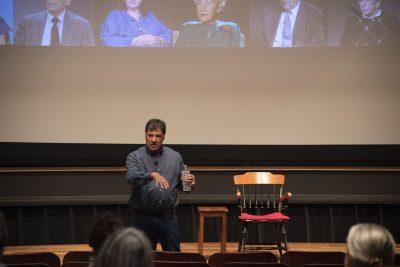A collage of a face flashes on screen. Some of their visages were captured nearly 20 years ago, and yet, the stories they’re about to tell remain equally as relevant and powerful as they did all those years ago.

Boston University’s Howard Thurman Center partnered with BU Hillel and the Elie Weisel Center for Jewish Studies to bring “Soul Witness: the Brookline Holocaust Witness Project” to the Tsai Performance Center. The film compiles 39 interviews with witnesses and survivors of the Holocaust from Brookline, depicting their stories that were long kept silent.
Leon Satenstein, an American who witnessed the liberation of Dachau, Germany while serving in the U.S. Army, and Regina Barshak, a Holocaust survivor from France, would both find themselves living in Brookline almost half a century after the war had ended.
Together, they decided that their stories and the stories of their neighbors needed to be documented and shared, and began the project in 1990.
With the help of Lawrence Langer, a Holocaust testimony expert who took on their project and conducted the majority of the interviews with the Brookline witnesses and survivors, more than 80 hours of footage was compiled for the film.
The interview tapes were kept in a storage unit at the Brookline Health Department Building for more than 20 years while Satenstein, Barshak and the rest of the group worked on raising funds to edit and archive the film.
But by the time Satenstein passed away in 2012, the tapes remained in storage, unknown to the public.
R. Harvey Bravman, a Brookline producer who later became the documentary’s director, was contacted by Dr. Lloyd Gellineau, Brookline’s Chief Diversity Officer, about the lost tapes in 2014, and was asked to uncover the interviews and bring Satenstein and Barshak’s dream to life.
“They wanted it to be a living memorial,” Bravman said during a discussion after the film’s screening. “My goal was to make that happen.”
Bravman, who also has a writing credit on the film, spent three months watching the interviews and attempting to cut down the more than 80 hours of footage — he managed to get it down to 60 minutes. Many single interviews ran over seven hours long, Bravman said and had to be conducted over multiple days.
“The hardest part about making this film was I had to tell a cohesive story,” Bravman said. “Sometimes you have to edit a part out because it doesn’t serve the story.”
At the screening, Bravman stressed the importance of simply listening to the stories. He said many survivors didn’t tell their stories for years, even to their family members. When given the platform to speak, Bravman said, they just want to be heard.
“They were in great pain when they gave their testimonies, but I think they felt that they needed to tell their stories,” Bravman said. “It’s innate in us, the need to be heard.”
Pedro Falci, the associate director of the Howard Thurman Center, said the event was organized so students could come out and learn about the Holocaust outside of the classroom.
The Boston area contains the fourth largest Jewish community in the United States, with around 248,000 Jewish people according to a 2015 study by Brandeis University. Bravman stressed during the discussion after the screening that many Jewish Bostonians remain uninformed about the stories of those depicted even while living amongst so many survivors.
Mira Kirshner, who grew up in Boston and is featured in the film, described the moment she and her niece, while still in Europe, found a U.S. soldier from the city who happened to “speak Jewish” and lived next-door to her family. The stroke of luck was how she was able to get in contact with her family back home.
The film also tells the story of Donia Mir, who hid in a bunker deep in the forest for 19 months, and of Victor Penzer, who created fake personal documents to escape and helped other Jewish people do the same. Rena Chernoff is another resident in the film who recounts the moment she saw her brother for the last time.
A work-in-progress version of the film was first screened in 2017 at the Coolidge Corner Theatre to a sold-out auditorium. The director’s cut was completed in October last year according to the film’s website.
The stories from the documentary have also been featured in the Boston Globe, NPR and a segment on NBC Boston.
Aashna Pandya, a sophomore in the College of Arts and Sciences, said it was a powerful film to watch, especially because those on screen live less than three miles away from her dorm.
“It’s important to show this particular film at BU because of our proximity to Brookline,” Pandya said. “We go there to shop or to eat or to watch a movie without really knowing the people who live there.”
In honor of National Newspaper Week, we’re asking you to make a donation to The Daily Free Press. The financial support of our community is important now more than ever to help us continue writing stories like this for readers like you. Please chip in whatever you can. Read more and make a donation here. Thank you.























































































































